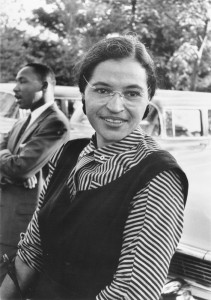
In the late 1990s, Rosa Parks and her foundation applied to start a charter school in inner-city Detroit. She wasn't thinking about privatizing education; she was thinking about ways to lift up the struggling students in her community. The same impulses have guided the African-American drive for educational freedom for centuries. (Image from Wikimedia Commons)
A few weeks ago, an African-American parent in Florida took the NAACP to task in a guest column for one of the state’s leading African-American newspapers.
Wevlyn Graves was upset because the NAACP’s Florida chapter had joined the state teacher union in a lawsuit to kill the state’s tax credit scholarship.* The 15-year-old initiative is now the largest private school choice program in America, and it’s expected to serve more than 90,000 students this fall. That includes more than 20,000 African-American children. That includes Graves’s 10-year-old son.
“You’re telling me the NAACP is fighting against the ability of African American parents to have more options and choices to further their children’s education,” Graves wrote, “when African Americans have been fighting for that since the beginning? Are you serious?”
I thought of Graves’ op-ed when it surfaced last week that delegates to the NAACP’s national convention had passed a resolution calling for a national moratorium on charter schools.
I appreciate her column because it offers the view of a school choice parent. Their views are too often absent from school choice debates, including this ongoing debate over the NAACP and charters.
I also think Ms. Graves makes a particularly powerful point about school choice history.
Before I go on, a disclaimer: I have nothing but respect and admiration for the NAACP. It pains me to not be on the same page, on this issue, with a group that has done so much, for so many, for so long.
At the same time, I think it’s fair to offer a little more context, especially to progressives who may not follow education issues closely, and who may be reflexively swayed by the NAACP position. They should know there is far more to the NAACP story, and they can read and hear some of the pushback from African-American leaders here, here and here.
To add to Ms. Graves’s thread, there are strong currents of educational freedom that course throughout American history, and they are particularly deep in African-American communities. The NAACP and its surrogates say they’re worried about privatization when it comes to both charter schools and state-supported private school scholarships. But African-American communities have not shied from private schools, charter schools or private philanthropy in education, not when it enabled them to access or create better alternatives for their children.
Mary McLeod Bethune wasn’t aiming to privatize education in 1904, when she founded a private school, the Daytona Educational and Industrial Training School for Negro Girls. She created the school because the public schools were so bad.
Privatization wasn’t on Marva Collins’s mind in 1975, when she took $5,000 from her teacher’s retirement fund to start Westside Prep, an acclaimed private school for low-income black kids in Chicago. She was moved to do so because she could not stomach the epidemic of black children being labeled “disabled” in public schools, and doomed by low expectations.
Rosa Parks wasn’t trying to ring up cash registers in the late 1990s, when she and her foundation applied to start a charter school in Detroit. She wanted to lift up the struggling kids in her inner-city neighborhood, and instill in them the traits that made her an American hero: “dignity with pride, courage with perseverance and power with discipline.”
There’s a long list of other examples, and you can find a few more of them in our Voucher Left series.
The NAACP resolution meshed with another new denunciation of charter schools, this one from Movement for Black Lives. The activists’ platform argues “privatization strips Black people of the right to self-determine the kind of education their children receive,” and calls out three, charter-supporting philanthropic foundations – Gates, Broad and Walton. Their overriding concern is a lack of community control over education.
Here again, I think a little history is more useful than a point-by-point response.
Before Gates, Broad and Walton, another mega-philanthropist threw himself into education reform. Julius Rosenwald, the president & CEO of Sears Roebuck, helped ignite an explosion of new educational options a century ago. Amped up by the pathetic conditions of segregated public schools, he started a foundation that offered seed money for new schools in return for an empowering trade-off: African-American communities had to run the schools, raise the bulk of the funding and, in many cases, secure the land.
The result: Between 1917 and 1932, 5,000 little “Rosenwald schools” blossomed from Maryland to Florida to Texas. They became the pride of the African-American communities that built them, administered them for decades and, in all but the official sense, owned them. In an ironic twist given the separate-but-unequal backdrop, they may have marked a high point for black community control over public education.
In the big picture, I see Rosenwald schools and today’s charters, vouchers and other school choice options as related – as successive waves in that ever-flowing current of educational freedom.
All of it deserves fair-minded scrutiny, and the school choice movement should heed the concern that, too often, “parents, teachers, and students are left out of the decision making process” that determines how their communities are educated.
But the primary motivator, then and now, isn’t privatization. It’s a well-founded belief that an expansion of options and opportunity for the students who need it the most, and a shift in power to those who know them the best, can benefit all of us.
* The Florida Tax Credit Scholarship is administered by nonprofits like Step Up For Students, which hosts this blog.